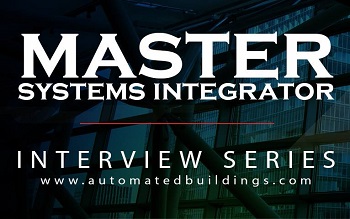|
December 2017
Interview
AutomatedBuildings.com
|
[an error occurred while processing this directive]
(Click
Message to Learn More)
|
EMAIL
INTERVIEW – Scott Cochrane and Jason Houck
 Scott Cochrane is President and CEO of Cochrane Supply & Engineering, a leading industrial IoT and building controls supplier
with locations throughout Michigan, Ohio, and Kentucky, as well as one
in Canada. In 2000, Scott took over the business from his father,
Donald Cochrane, Sr., who founded the company 50 years ago. He is proud
to be an advisory council member for multiple industry manufacturers
such as Honeywell, Johnson Controls, and Tridium, and to be named a
2016 IBcon Digital Impact Award Winner for his innovative contributions
to the industry.
Scott Cochrane is President and CEO of Cochrane Supply & Engineering, a leading industrial IoT and building controls supplier
with locations throughout Michigan, Ohio, and Kentucky, as well as one
in Canada. In 2000, Scott took over the business from his father,
Donald Cochrane, Sr., who founded the company 50 years ago. He is proud
to be an advisory council member for multiple industry manufacturers
such as Honeywell, Johnson Controls, and Tridium, and to be named a
2016 IBcon Digital Impact Award Winner for his innovative contributions
to the industry.
 Jason Houck is CIO of Hepta Control Systems and is in charge of the
design and implementation of smart building networks. An experienced
professional in the control systems integration and intelligent
building industry, he has been an integral part of designing
world-class systems that have earned international honors. These
systems include a scope that ranges from systems design for new
construction to integration of legacy equipment in landmark structures.
Jason was honored as a “Young Gun” award-winner at the 2014
ControlTrends Awards and was named one of dBusiness Magazine’s “30 in
Their Thirties” for 2015.
Jason Houck is CIO of Hepta Control Systems and is in charge of the
design and implementation of smart building networks. An experienced
professional in the control systems integration and intelligent
building industry, he has been an integral part of designing
world-class systems that have earned international honors. These
systems include a scope that ranges from systems design for new
construction to integration of legacy equipment in landmark structures.
Jason was honored as a “Young Gun” award-winner at the 2014
ControlTrends Awards and was named one of dBusiness Magazine’s “30 in
Their Thirties” for 2015.
Hepta Systems is an award-winning leader in integrated building
automation and security controls. They provide single, driver-seat
solutions for energy efficiency, security and tenant comfort systems
efficiency in buildings.
Master
Systems Integrators (MSI)
They make sure all systems communicate properly, coordinate all project
participants, collaborate with building owners to ensure systems
information will be accessible and usable, and they develop software
layers responsible for integration, aggregation, and communication of
the building systems.
Scott
Cochrane of Cochrane Supply & Engineering has the unique benefit of
working with 300+ of the best systems integrators in the country.
Cochrane recognizes the critical role they have within the building
automation industry and is speaking with a different highly-regarded
MSI each month with the goal of providing examples of industry trends,
best business practices, and the growing value of an MSI. This month,
he interviews Jason Houck from Hepta Control Systems.
November Interview with
Geoff Hunter, President and Senior Principal of Palmer Conservation
Consulting
(PCC)
October
Interview with Scott
Cochrane &
Brian Oswald, Managing Director for CBRE
| ESI.
September
Interview with Scott
Cochrane & Joe
Napieralski the Co-Founder and Director of Development of Smart
Building Services LLC
August Interview with Scott
Cochrane &
Sidney H. Blomberg, Jr. the founder and President of K
& S Ventures, Inc
July Interview with Scott
Cochrane and Ken Sinclair
This
month,
he interviews Jason Houck from Hepta Control Systems.
Cochrane: How did you become an MSI?
Houck: Becoming an MSI
was not so much a conscious decision as a result of our process to
continue to innovate in the intelligent buildings industry. We never
sought out to offer services based on a pre-existing description of
what a Master Systems Integrator should be able to do, so much as we
tried to stay at the leading edge of the industry as a whole. For
instance, we didn’t add an IT department and a software development
department because they allow us to call ourselves an MSI. We added
those departments because we found ourselves in a situation where the
best way to remain a strong partner with our customers was to add
services that competitors were still trying to avoid. We are constantly
tweaking with our operations to make sure that our customers can rely
not only on the work we do but on the projects we recommend.
Cochrane: Can you explain what some of the characteristics are of a good MSI?
Houck: I
don’t think there’s a dictionary definition, or accepted guideline of
what an integrator should do, step-by-step to be considered an MSI. If
there is a short answer it would be the strategic ability to offer open
technologies, the technical knowledge to understand when “open” doesn’t
truly mean open, and the relationship with the customer to explain the
difference.
For Hepta, some of the things that we feel set us apart are that we
aren’t just willing to work with non-traditional stakeholders within
our customer’s organizations, we seek them out to find out what we can
do to serve groups that may otherwise be ignored. Having that in-house
IT department helps us offer peace of mind in terms of network and
cybersecurity. Beyond that, we try to keep a diverse staff whose
strengths come together in really positive ways. Rather than a small
group of “jack-of-all-trades” technicians, we have a big team with a
wide range of specialties, whether it be graphic design, UI and
workflow design, programming, installation or any of a number of other
vital aspects of each project.
Cochrane: How do you sell Master Systems Integration services?
Houck: While there are
starting to be more and more advanced customers out there who already
know the benefits of working with an MSI, we find that there is still a
lot of work to be done in explaining the difference between integrators
and MSIs. The earlier we can get involved in a project, the easier it
can be to clearly show these benefits, through involvement in design
and procurement.
Our main priority in the MSI role is to serve the customer as an
overall technology partner. Sometimes this means making unpopular
recommendations like slowing a process down to make sure that
stakeholders really understand the benefits of different technologies,
or altering a scope and having it re-bid, but in the long run we feel
like that kind of difficult conversations are something that set MSIs
apart in the industry.
Cochrane: How do your customers procure MSI services? What’s the structure of the contract you’re in?
Houck: In a lot of cases we will come in as a
consultant to ownership to help guide projects through the lifecycle,
but we also aren’t afraid to answer RFPs in cases where a customer has
either together or with the help of an existing partner, written an MSI
scope into their specification.
Cochrane: As
an MSI, what percent of your time is spent in the following categories?
R&D, Consultations, Field Commissioning, and Software Programming.
Houck:
R&D – 30%
Consultation - 30%
Software Programming – 20%
Field Commissioning – 20%
[an error occurred while processing this directive]
Cochrane: Describe a challenge that you’ve encountered as an MSI.
Houck: Throughout the industry, it’s become very popular and very easy
to market a product or a solution as an “open” technology. Advertising
an “open” API is not the same thing as offering one, which can lead to
a lot of confusion for customers who may have already put in a lot of
time and effort just to get to the stage of developing a strategy and a
scope for an intelligent building. Likewise, there’s no certification
process that anyone has to go to in order to tell a prospective
customer that they are an MSI. There is a lot of noise to cut through
in the industry right now, and we spend a lot of time doing everything
we can to make sure our customers understand how to filter flash from
substance.
Buzzwords in this industry are plenty, and changing all the time, and
in a lot of cases, the team with the best marketing wins by leveraging
those buzzwords into solutions that only sniff the surface of what
customers need.
Cochrane: Do you envision Master Systems Integration being a part of your business in the future? If so, how?
Houck: We plan always to offer the services our
customers need to implement and maintain their projects and facilities.
Right now, MSI services are the best way for us to do that, and we
don’t envision a major change to that in the near future. That being
said, our agility and willingness to take risks in the name of
innovation are what’s made us an MSI in the first place, and that makes
us confident that we can continue to grow and adapt with the
technologies that make this such an exciting industry to be a part of.
footer
[an error occurred while processing this directive]
[Click Banner To Learn More]
[Home Page] [The
Automator] [About] [Subscribe
] [Contact
Us]
 Scott Cochrane is President and CEO of Cochrane Supply & Engineering, a leading industrial IoT and building controls supplier
with locations throughout Michigan, Ohio, and Kentucky, as well as one
in Canada. In 2000, Scott took over the business from his father,
Donald Cochrane, Sr., who founded the company 50 years ago. He is proud
to be an advisory council member for multiple industry manufacturers
such as Honeywell, Johnson Controls, and Tridium, and to be named a
2016 IBcon Digital Impact Award Winner for his innovative contributions
to the industry.
Scott Cochrane is President and CEO of Cochrane Supply & Engineering, a leading industrial IoT and building controls supplier
with locations throughout Michigan, Ohio, and Kentucky, as well as one
in Canada. In 2000, Scott took over the business from his father,
Donald Cochrane, Sr., who founded the company 50 years ago. He is proud
to be an advisory council member for multiple industry manufacturers
such as Honeywell, Johnson Controls, and Tridium, and to be named a
2016 IBcon Digital Impact Award Winner for his innovative contributions
to the industry. 